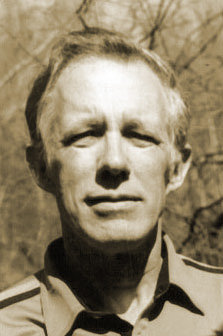From The Fame of a Dead Man’s Deeds:
An Up-Close Portrait of William Pierce
by Robert Griffin
In William Pierce’s novel, The Turner Diaries, the events that set off the anti-government terrorist acts of Earl Turner were a series of brutish government raids on gun owners following the passage of federal legislation outlawing the private ownership of firearms. Turner reacted to the raids by blowing up a federal building with a fuel-oil and fertilizer bomb concealed in a truck. Not only was the composition of the fictional bomb almost exactly the same as the one Timothy McVeigh constructed and detonated, it was also almost exactly the same weight. It seems very probable that McVeigh saw parallels between the government raid on the Branch Davidians in Waco to enforce anti-gun laws and the gun raids portrayed in The Turner Diaries, and that McVeigh responded to what he saw as the unwarranted and violent assaults on gun owners in Waco the same way that the protagonist in Pierce’s book, Earl Turner, had responded to the heavy-handed crackdowns on gun owners by agents of the fictional federal government.
Anti-Defamation League [Note of the Ed.: A Jewish hate group] sources have reported that just days before the bombing, McVeigh mailed an envelope to his sister in Florida containing copies of the cover and selected pages from The Turner Diaries. He included a note that said she should be sure to read the back cover. On the back cover of The Turner Diaries at the top in bold black letters is the question, “What will you do when they come to take your guns?” And then the answer: “The patriots fight back with a campaign of sabotage and terror.” When McVeigh’s sister learned of her brother’s arrest in connection with the bombing, she burned the contents of the envelope.
Incidentally, McVeigh’s accomplice in the bombing, Terry Nichols, also may have been influenced by the writings of William Pierce. Federal agents found a copy of another of Pierce’s novels, Hunter, in Nichols’ home. They saw few other books in the house. Hunter, written in the late 1980s, is Pierce’s follow-up to The Turner Diaries. It recounts the exploits of Oscar Yeager, who tries to “cleanse” America by killing first interracial couples and then Jews.
In the weeks immediately preceding the bombing, McVeigh stayed at the Imperial Hotel off Route 66 near Kingman, Arizona. Several sources have reported that between April 5th and April 11th McVeigh made seven calls to a message center operated by a radical right-wing organization called the National Alliance. The chairman of the National Alliance is William Pierce. Two of the seven calls allegedly were patched through to Pierce’s unlisted number in West Virginia where he is headquartered.
The Turner Diaries was the very first piece of evidence introduced by the prosecution at McVeigh’ s trial in Denver. During the trial, several of McVeigh’s friends told the court that he had mailed them copies of the book along with a note encouraging them to read it. One of them, Kyle Kraus, a buddy from McVeigh’ s army days, testified that when he learned of the Oklahoma City bombing, he was immediately reminded of scenes from the book and grabbed the copy McVeigh had sent him and took it to the local FBI office.
McVeigh’s first contact with The Turner Diaries came when he was in the army and ran across an advertisement for the book in the mail order section of the survivalist magazine, Soldier of Fortune. McVeigh ordered the book and according to those around him at the time awaited its arrival with eager anticipation. When the book finally arrived, McVeigh became obsessed with it, reports his roommate William Dilly. “He took it into the field and read it for three weeks straight,” Dilly said. “He said it was really wild and tried to get me to read it.” Another friend of McVeigh’s, Brandon Sticky, said that McVeigh read and re-read the book and was known for constantly carrying his well-thumbed copy of the small paperback around with him in his pocket.
After leaving the service, McVeigh sold The Turner Diaries at weekend gun shows, often for less than his own cost. Fellow gun-show merchants said it was as if the contents of the book were his religion and he were looking for converts. “Mostly, McVeigh’s fervor came from The Turner Diaries,” a gun collector who crossed paths with him said later. “He was its greatest publicist. He carried the book all the time. He sold it at the shows. He’d have a few copies in the cargo pocket of his cammies. They were supposed to be $10, but he’d sell them for $5.”
Apparently The Turner Diaries altered the course of Tim McVeigh’s life as well as the lives of thousands of people in Oklahoma City. And to the extent that the Oklahoma City bombing is a memorable event—and even, in ways that are not clear to us now, a significant event—William Pierce’s self-published novel has become part of the history of America.
